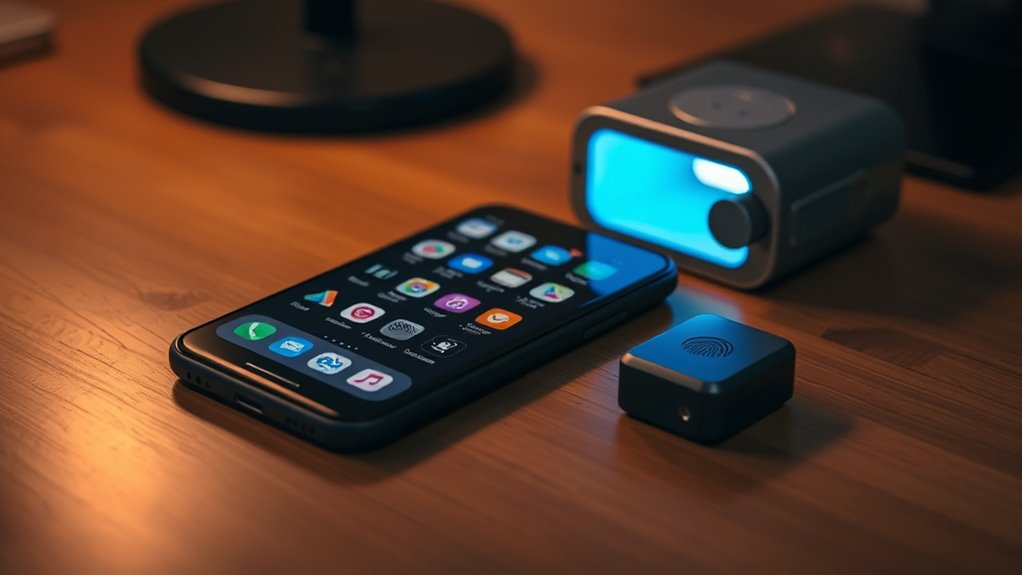Secret apps and vaults are discreet digital tools designed to hide sensitive content like photos, messages, and videos. They disguise themselves as common apps or look like calculators to avoid suspicion. By using passwords or biometrics, they keep private information secure from prying eyes. Many people use them to conceal affairs or secret activities. Knowing how these apps operate can help you spot or protect against hidden content—if you continue, you’ll learn more about their secrets.
Key Takeaways
- Secret apps mimic regular icons, hiding private content like messages, photos, and videos from partners or family.
- They use passwords or biometric security to protect sensitive information from unauthorized access.
- Disguised icons and dummy apps prevent detection, making secret content easily concealable.
- Features like break-in alerts and auto-deletion help users maintain privacy and secrecy.
- These tools enable cheaters to conceal illicit relationships and private activities discreetly on their devices.

Have you ever wondered how people keep their private photos, messages, and files safe from prying eyes? The answer often lies in secret apps and vaults—powerful tools that hide, encrypt, and disguise sensitive content from anyone who might stumble upon them. These apps act as digital safes, giving users a way to conceal evidence of their private lives. They’re designed to look like ordinary apps or even dummy programs, so anyone glancing at their device wouldn’t suspect anything unusual. When you open them, they reveal a hidden world of photos, videos, messages, or documents that are locked behind passwords or biometric security.
Many of these apps operate seamlessly in the background, appearing as regular icons on your home screen. Some even disguise themselves as calculators or music players, making it impossible for an outsider to recognize their true purpose. Once inside, you can store content that you don’t want others to see. Some vaults also offer additional features like break-in alerts, which take a photo of anyone attempting to access the app without permission. That way, if someone tries to snoop, you get a little warning or evidence of their curiosity. It’s a clever way to maintain privacy while keeping a close eye on who’s trying to invade it.
People use these tools for a variety of reasons—some want to protect personal or sensitive information from friends or family. But in the context of cheating or infidelity, these apps become even more tempting. They allow users to hide evidence of secret relationships, flirtatious messages, or clandestine photos. With a secret app, a person can send and receive messages away from prying eyes, ensuring their private affairs stay hidden. They might also set up multiple accounts or use encrypted messaging apps that delete messages automatically, further complicating efforts to uncover the truth. Additionally, understanding the different types of privacy protection tools can help in recognizing when someone is attempting to conceal their activities. These apps often utilize disguised icons to make detection even more difficult, which is why being aware of their existence is crucial for privacy awareness. Knowing how these tools work can also assist in detecting hidden content on devices, which is essential for investigators and concerned individuals alike.
The use of these apps isn’t limited to hiding romantic secrets; some use them to keep financial information, private conversations, or other sensitive data away from curious or malicious actors. But because they’re so easy to conceal and access, they’ve become a go-to tool for those wanting to keep secrets, whether for personal privacy or deception. Interestingly, the development of these apps is often driven by the increasing demand for digital privacy and security, which makes understanding their mechanics essential for both personal protection and investigative purposes. The key takeaway is that these apps empower users to control what others see, often without leaving behind obvious traces. So, if you’re trying to uncover hidden affairs or protect your own privacy, understanding how these secret apps work can be essential. They’re sneaky, sophisticated, and effective, making them a common choice for those who want to hide their tracks in plain sight.
Frequently Asked Questions
How Can I Detect Hidden Apps on My Partner’s Phone?
If you’re worried about hidden apps on your partner’s phone, start by checking their app list thoroughly. Look for unfamiliar or recently installed apps and review their storage. Use built-in tools or third-party apps to scan for hidden or encrypted files. Also, monitor their data usage and battery drain, which can indicate background activity. Trust your instincts and communicate openly to address any concerns you have.
Are There Legal Consequences for Secretly Accessing Someone’S Private Apps?
Around 60% of people believe secretly accessing someone’s private apps is unethical, and legal issues can arise if you do so without permission. If you violate privacy laws or break a court order, you could face criminal charges, fines, or even jail time. So, before you try to access someone’s private apps, consider the legal risks and potential consequences. It’s best to respect privacy and seek honest communication instead.
What Signs Indicate Someone Is Using Secret Vault Apps?
You might notice unusual phone activity, like hidden app icons, password changes, or apps that disappear after closing. They could be clearing notifications or hiding browsing history. If your partner becomes secretive about their phone or quickly closes apps when you’re near, these are red flags. Keep an eye out for unexplained data usage or new, unfamiliar apps. These signs suggest they might be hiding something, possibly using secret vault apps.
Can Secret Apps Be Used to Track Someone’S Location?
You might wonder if secret apps can track someone’s location. While many apps do have location-sharing features, hidden or secret apps typically don’t offer this function directly. However, some sneaky apps might access your device’s GPS or sync with other apps to gather location data. If you’re concerned, check your device’s settings and app permissions regularly to see which apps have access to your location and revoke permissions if needed.
How Effective Are App Lock Features in Preventing Discovery?
App lock features can be quite effective in preventing discovery if used correctly. They block access to specific apps, making it harder for someone to open and see private messages or hidden content. However, tech-savvy users might find ways around these locks, like force stopping apps or restarting devices. So, while helpful, app locks shouldn’t be solely relied on for complete privacy or security.
Conclusion
You might be surprised to learn that nearly 25% of people involved in infidelity use secret apps or vaults to hide their activities. These sneaky tools make it easier than ever to keep affairs hidden from loved ones. Staying aware of these tech tricks can help you protect your relationship and recognize the signs of deception. Remember, understanding these tools is the first step toward strengthening trust and maintaining honest communication with your partner.









